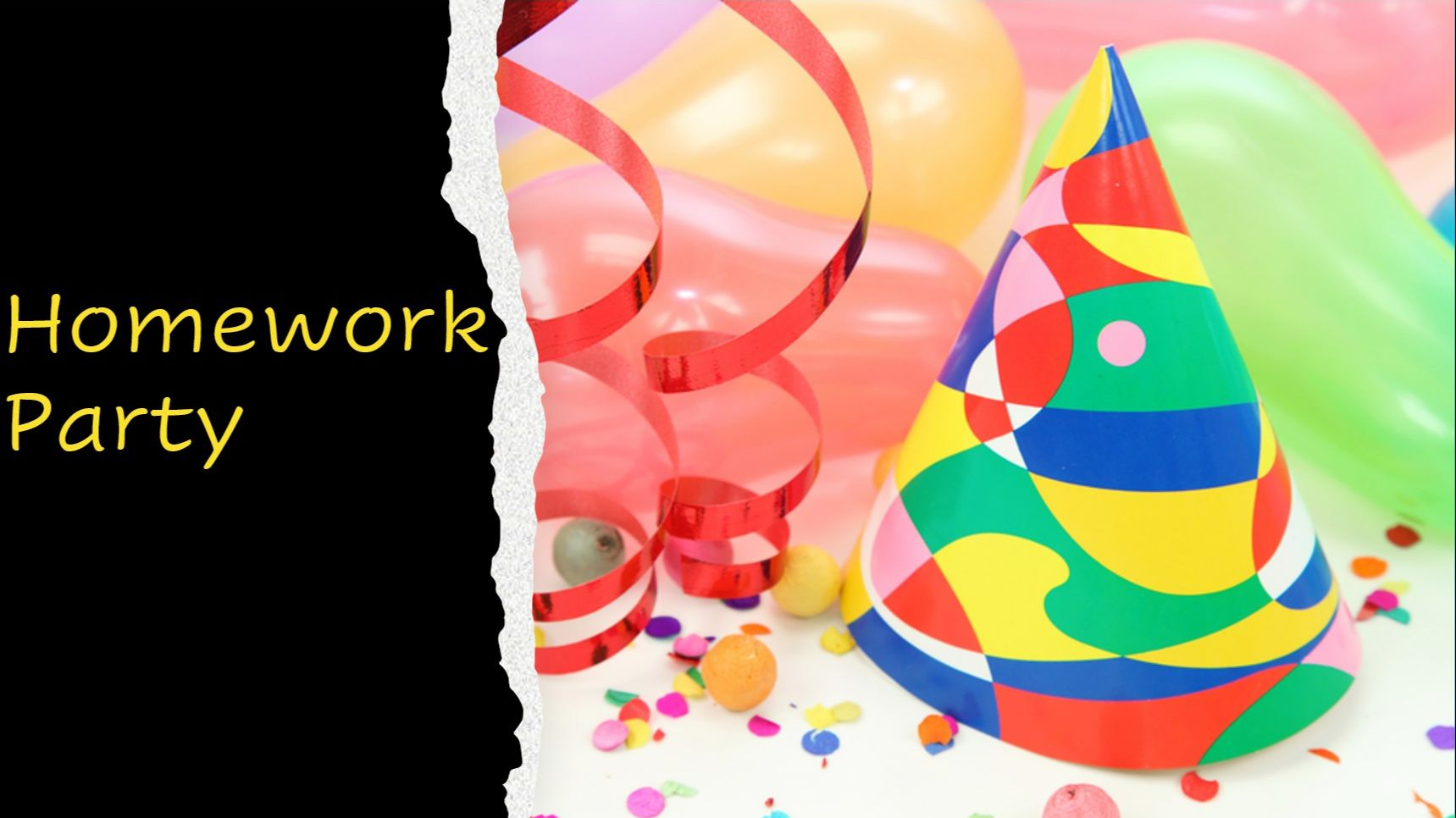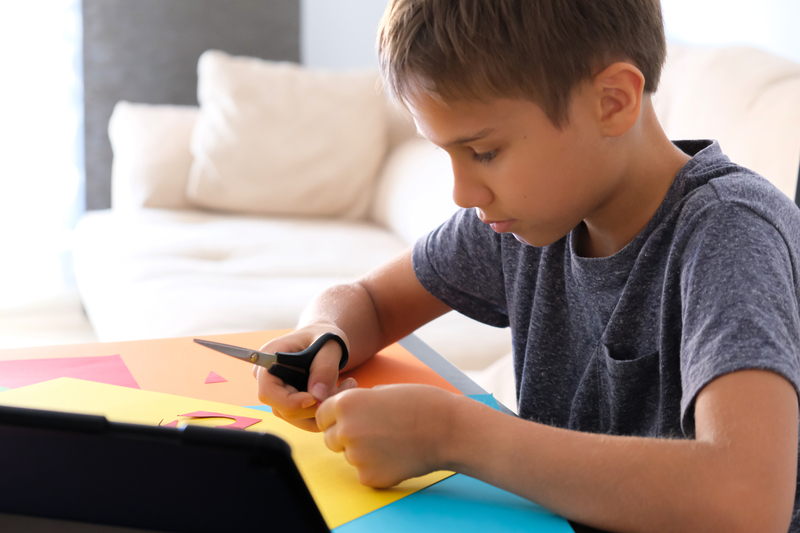
Mix it UP! Have a Homework PARTY!
Do you need a way to liven up your child’s after school routine? To breathe some motivation -even excitement, into the homework routine?
Try this! Have a “Homework Party!” Or a “Homework Play Date!”
Think about hosting a homework event -especially if you are looking for a way to combat the winter blues.
Mid-week play dates are usually unheard of. What if, instead, homework became the reason for the get-together?
Even if the children being invited are from different classrooms and have different assignments, let the kids work on their assignments together and help each other. If friends are invited from your child’s classroom, it’s more likely everyone will be on the same page. Of course, you might need to assist with homework as needed.
As crazy as this sounds, it might help to mix things up.
A “Homework Party” can be as well thought out as a birthday party or unstructured and spur of the moment like a play date. Consider planning ahead of time and giving your child the opportunity to contribute to the plans.
Here’s what I’m thinking.
If you’ve been around here, reading my blog for awhile, you know I like activities that not only allow children to create, but also participate in the planning stage. I also like activities that provide children opportunities to interact with their parents and others. A Homework Party (or play date) is yet another way to do that…and more!
Start by proposing the idea to your child and then begin brainstorming ideas.
Don’t hesitate to identify boundaries for the event. Clear expectations will increase the success factor!
When children participate in the planning stages, it gives them opportunities to explore their own ideas and test them during the real event. The process of planning can be loaded with teachable moments. Brainstorming stretches imaginations. Planning and preparing will exercise creativity and problem solving. Experiencing the plan in action gives a sense of accomplishment and leads to self confidence. Reflection after the party builds perspective and insight. How’s that for a line-up of reasons to do this?
Make sure to capture the planning and preparation stages with pictures and short videos. I’ll circle back around to this idea in a few moments.

Invitations and Signs: Writing skills naturally become a part of the preparations. Write invitations. Make signs for the party.
Will there be a theme for the party: seasonal, your child’s favorite character, sport(s), mindset or encouragement theme? “Work & Play! HERE!” Or, “Let’s work our best so we can play our best!”
Fine and gross motor skills are automatically a part of most -if not all, preparations. I’m all for kids learning to navigate computer software that facilitates creativity, but it’s also important to use scissors, crayons or markers, and glue sticks.
If your child isn’t familiar with a program like Canva or PowerPoint, now is not the time to introduce it. Exploring and learning a new program is probably better as an activity of it’s own -for the sake of time management and planning the event at hand.
Make sure the invitation (either paper or verbal) emphasizes this is not just a play time, but a work and play time. You want to prepare everyone for a successful experience by helping them have the right expectations. Since it's possible this may be the first invitation they've received to a 'homework party' include approximate time blocks so guests have an idea of how the event will flow.
When kids are creating with paper and scissors, I like to add a new material into the mix. It jumpstarts different thinking -planning and creating. The new material can be as simple as a spool of string or yarn, a sheet of stickers, a large piece of poster board. Resist the urge of adding several items, just one will do the trick, not a whole drawer full. One additional item per event is all it takes to prompt your child to explore and process ideas differently.
What’s really cool is when an empty box is used as a display cube. It’s so simple but kids love using the four sides and top to display theme based slogans and decorations.
Favors: Most parties include party favors. It doesn’t have to be anything complicated. What about a pencil, with a special design -maybe related to the party theme! Maybe a bookmark -either purchased or designed by your child and personalized with the party theme &/or personalized.

Food: What about food? As you extend invitations, be sure to include a question about food allergies. Keep the food plan simple. It can be tempting to prepare something that has a high presentation appeal. Save your energy, you may need it during the party!
How many? Who?: How many children will be a good number to help your child have a successful event? Also, will you have extra adults to help during the event?
Keep in mind, this is not just a party, it’s a homework-party. Kind of like a work-party. When deciding how many children to invite, keep that in mind.
Equally important to the number of children being invited is the ‘who’. Consider personalities and types of help they may need to complete their homework. As I mentioned above, it’s possible that the children can offer each other help, but not if they all struggle with school work.
Also consider how the children will get from school to your house. Will parents be responsible for bringing their child to your house after the bus drops them off? Or, will the number of children coming to the event be small enough to fit in your own vehicle?

Schedule: Decisions about sequence of activities and estimating the amount of time for each activity is such an powerful learning opportunity for your child. Don't make these decisions separate from your child. Make them together...and be okay with a certain degree of wrong decisions, knowing your child will learn first hand.
How structured with the time be? Physical activity will be very important, but what if the weather spoils the plans for outdoor play? Can there be a back-up plan for a type of exercise?
Will there be enough time for a party game or activity? Could a game be designed to help the group practice a current skill or topic they are learning in school? Consider games with minimal amounts of competition, some kids don't play games very well. Try bingo or turn a game like Jeopardy into a whole group activity rather than risking negative energy from a competition between teams or individuals.
Or, could an activity like a science demonstration or experiment be in the plan as an entertainment factor? Lot’s of options to consider. Don’t include everything and make the event too long. Keep options to make future events different than the first. You never know, this might become 'a thing!'
Take pictures: Once it’s party time, don’t forget to capture some of the moments in pictures and short videos.
Let the good times roll!
Use your energy to encourage and compliment the children supporting one another. Try to identify strengths for each child and encourage them through these characteristics to help one another. 'Knowing how to do the assignment' isn't the only helpful contribution someone can make to the group. Look for positivity, an encourager, those who can laugh at their own struggles, neatness, focus -everyone has traits they can contribute to the good of the group. When you acknowledge those traits, the group will learn what is valued for this type of event. Then, when the group transitions to a different, less structured activity, acknowledge different contributions that are best for that moment.
After the party: The learning doesn't have to end when the party is over!
Enjoying pictures and short videos can prompt discussion and reflection, especially if you offer open-ended questions. Try prompting reflections with some of these:
- ”There are several things I’m proud of you for. But before I share them with you, what’s something about the process of preparing, or the actual party, that makes you feel proud of yourself?”
- “What was a disappointing part of the preparation or party?”
- “Would you like to do this again next winter?”
- “What is something you would definitely do next time, in the same way?”
- “What is something you wouldn’t do the next time, or would do differently?”
Be prepared to tell your child specific actions and decisions that you are proud of or that impressed you. Make encouraging statements about your child's decisions and actions. This is a time to speak specifically about the positive actions of your child, not the other kids.
Also be prepared to describe special moments during the party that your child didn’t have the opportunity to see -like positive interactions between others that didn’t involve your child.
It can also be encouraging to your child if you offer to contribute something more to the next event. (There I go again! Come on, admit it, this could become 'a thing'.)
Being supportive through your actions speaks loudly. Consider increasing your commitment or contribution to a future event like this. It might be that you are actually offering to repeat the event that is your action of support. But it could also be a boundary you are willing to expand -like an additional 30 minutes for the event, contributing an extra $10 to the event budget, an increase in the number of invitations, or anything that your child will value having added to the event. Increasing your level of support for a repeat-event is a thoughtful way to acknowledge your child’s efforts.
Have your child select ten pictures that best show the whole event. Including the planning stage, preparations and ending with the actual party. The collection of pictures could be printed and organized in a small scrapbook with handwritten captions to summarize each step. Or, apps like PowerPoint or Canva can be used to make a digital poster or booklet to be saved or printed.
The process of selecting, sequencing and writing captions for pictures promotes opportunities for your child to reflect on the experience. Reflection fosters a sense of accomplishment which can then boost self esteem. Of course, it’s also time to identify what worked well and what didn’t. It’s tempting, as the adult, to voice your own perspective, but give your child the opportunity to experience self-reflection without influencing with your evaluation of it all.
Can you see what a fun time it could be for your child to host a homework event like this? Start by identifying a date on the calendar that is far enough in advance with enough time to work through the process -the teachable moments. As I often say, keep it simple and build on it from there.
Let's create s’more teachable moments for your child, together.
Ron
Want to strengthen your child's learning opportunities in just minutes each day?
Use my FREE Q&A to make learning fun for your child during everyday moments you already spend together!
I hate SPAM. I will never sell your information, for any reason. Unsubscribe at any time.

